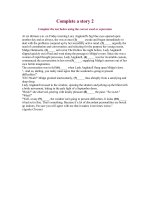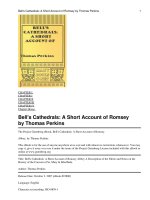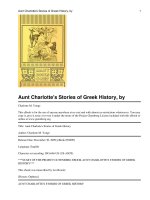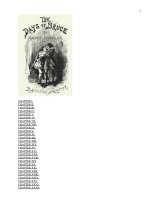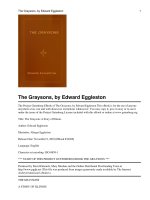CHARLOTTE’S WEB: A STORY ABOUT FRIENDSHIP
Bạn đang xem bản rút gọn của tài liệu. Xem và tải ngay bản đầy đủ của tài liệu tại đây (142.45 KB, 10 trang )
CHARLOTTE’S WEB: A Story about Friendship
A lesson by Allison Dalton
Center for the Advancement of Ethics and Character
Copyright 2003
AWARENESS
Making a new friend can be difficult and a little scary, but it
is something we all experience. Appeal to students’
firsthand experience in making and being a friend. Ask
students to remember a time when they were in a new
situation surrounded by people they did not know. Ask
students to reflect on the situation aloud as a group or
individually in writing. To guide them, ask:
• How did you feel?
• Were the people around you kind and welcoming or
mean and unfriendly?
• How did that affect your attitude?
• Why can it be scary to meet new people and make new friends?
• Why is it important to welcome others when they are in a new situation?
Read students the following passage about first impressions from page 41.
Charlotte stood quietly over the fly, preparing to eat it. Wilbur lay down and closed his eyes.
He was tired from his wakeful night and from the excitement of meeting someone for the first
time. A breeze brought him the smell of clover—the sweet-smelling world beyond his fence.
“Well,” he thought, “I’ve got a new friend, all right! But what a gamble friendship is! Charlotte
is fierce, brutal, scheming, bloodthirsty—everything I don’t like. How can I learn to like her,
even though she is pretty and, of course, clever?”
Wilbur was merely suffering the doubts and fears that often go with finding a new friend. In
good time he was to discover that he was mistaken about Charlotte. Underneath her rather bold
and cruel exterior, she had a kind heart, and she was to prove loyal and true to the very end.
Discuss the passage with students, asking:
• Did you ever have an experience like this, in which you thought of a person as
mean or strange or scary at first, but later found out that he or she was very nice?
• Can you learn to like someone you originally disliked? How?
• What do you think the speaker means by “What a gamble friendship is!” (p. 41)?
How can friendship be a gamble?
• What happens when people draw conclusions based on first impressions?
Keeping a friend is as important as making one. Read the students the following quote
from page 115: “Friendship is one of the most satisfying things in the world.” Ask
students to respond with their thoughts.
• How can a friendship be satisfying?
• What makes a friendship so enjoyable?
• Is friendship always easy? Does it make a friendship better or worse when friends
face difficulties?
• There are many types of friendships. List different types (for example,
friendships in the neighborhood, school friends, friendships between siblings,
friends from different out-of-school activities). How are these types of
friendships different from each other?
• In your experience, what is the most satisfying type of friendship? Does that
mean all the other types are not important?
UNDERSTANDING
Build understanding of the plot, characters, and themes of Charlotte’s Web by discussing
them as you read. Use these questions as a guide.
Chapters 1 and 2
Discuss the way Fern and Wilbur’s friendship began.
• How was Fern a friend to Wilbur before she had even met him?
• Who or what tries to get in the way of their friendship? Why?
Mr. Arable wants to kill Wilbur because he is a runt, but Fern insists this is unfair. “This
is the most terrible case of injustice I ever heard of,” she announces on page 3. Ask the
students the following questions:
• What is a runt?
• What does “injustice” mean?
• Why does Fern think it would be an injustice to kill Wilbur?
• Is Fern right, or should Mr. Arable have been allowed to kill the pig? Why or
why not?
Fern and Wilbur’s friendship is strengthened once they finally meet.
• What does Fern do now that makes her a good friend to Wilbur?
• How does Wilbur show his friendship in return?
Chapters 3 and 4
Discuss the episode in which Wilbur escapes from the barn.
• Did the goose give Wilbur good advice?
• When all the animals were suggesting different actions, what did Wilbur choose
to do?
• Why didn’t he listen to them?
• Did Wilbur make a good choice? Why or why not?
• Should we always listen to the advice that friends give us? Should we listen
sometimes? Why or why not? How do we know when their advice is good or
bad?
At Zuckerman’s barn, Wilbur has trouble making friends. Discuss Wilbur’s troubles.
• Wilbur feels bored and lonely at Zuckerman’s barn, even though there are many
more animals there to keep him company. Why? What is the difference between
being lonely and being alone?
• Wilbur makes a schedule for the day. He is planning to eat, sleep, dig a hole,
watch the flies, stand and think, and scratch his back. It sounds like a busy day
for a little pig, but he is still bored. Why aren’t these things enough to make him
happy?
• Wilbur tries to find a playmate. First he asks the goose to play with him, then he
asks the lamb. Why won’t the lamb play with Wilbur? Do the lamb’s reasons
make sense?
• When Wilbur asks Templeton to play with him, the
rat answers, “Play? I hardly know the meaning of
the word….I never do those things if I can avoid
them…I prefer to spend my time eating, gnawing,
spying, and hiding. I am a glutton but not a
merrymaker” (pp. 29-30). What is a glutton? What
is a merrymaker?
• Does Templeton’s life sound like fun? Why or why
not? What is his life missing?
Close to bedtime, Wilbur’s horrible day gets a little better when a voice calls down to
him that it will be his friend.
• How do you think Wilbur feels when he hears this?
• Who do you think the speaker might be?
• “I’ve watched you all day and I like you,” the voice says (p. 31). What did
Wilbur say or do during the day that would have shown the speaker that he would
make a good friend?
Chapters 5, 6, and 7
When Wilbur finally meets his new friend, he finds out that they are very different.
• List some of Charlotte and Wilbur’s differences.
• What are some of the things that Wilbur dislikes about Charlotte, or some of the
things she does that scare him?
• What are some of her good qualities, or what does she do that Wilbur likes?
• Does Charlotte fit in at the barn? How do the other animals react to her?
All the animals react differently to the bad news that the old sheep gives Wilbur.
• What does the old sheep think about the farmers’ plan to kill Wilbur? Why?
• How does Wilbur react to the news? How does Charlotte react? Fern? Why?
Chapters 8 and 9
Mr. and Mrs. Arable are very surprised when they hear Fern talk about the animals in
Zuckerman’s barn as if they could speak.
• Why do you think Fern has the ability to understand the animals?
• Why is Mrs. Arable worried about her daughter?
• Mr. Arable does not seem as worried as his wife. Why do you think he is less
worried?
Wilbur tries to be like his best friend by spinning a web.
• Why does Wilbur want to learn to spin a web?
• What does Charlotte tell him when he fails the second
time?
• Even though Wilbur does not learn how to spin a web,
what does he learn instead?
Wilbur is still worried about being killed at Christmastime.
• Why do you think Charlotte wants to think up a plan on her own? Should she let
Wilbur help her with the plan?
• How is Wilbur helping her by staying healthy and not worrying?
Chapters 10 and 11
Charlotte has some interesting ideas. She thinks that “people are not as smart as bugs”
(67), and that they are very gullible.
• What does “gullible” mean?
• Why does she think this?
• Are people truly gullible? Have you ever acted gullibly? Did anyone take
advantage of you?
• Predict how Charlotte might take advantage of this quality.
When Avery tries to capture Charlotte things start to go badly but turn out well in the
end.
• Why does Avery want to capture Charlotte?
• Why doesn’t he understand that he should leave Charlotte alone?
• How does Fern show friendship toward Charlotte?
• Does Avery eventually get what he deserved?
Charlotte finally reveals her plan to save Wilbur.
• How will writing a word on a spider’s web save Wilbur from
being killed?
• How do the Zuckermans, Lurvy, the minister, and the people
from town react to the news of Charlotte’s web? Why?
• How does Wilbur react? Why?
• What does Fern think of all the commotion?
• Has Wilbur changed at all? If he has not changed, why are
people treating him differently?
• Who continues to treat him the same as they had before?
• List the positive and negative results of Charlotte’s web. Do some results fall into
both categories? (Perhaps a Venn diagram could be used.)
Chapters 12 and 13
At the barn meeting, all the animals pitch in to help save Wilbur.
• Why do the animals want to save him now, even though most of them were not
going to attempt anything to save him when they first heard the old sheep’s bad
news?
• Why does Templeton agree to help Charlotte and Wilbur? What do you think of
his reasons?
Other characters are changing, too.
• How are his friends’ efforts to save him changing Wilbur? What new things does
Wilbur do? How does he feel different?
• Charlotte’s next word will be radiant. What does radiant mean? Why does
Wilbur feel radiant?
• Has Charlotte changed? Why or why not? What does she do that shows she has
changed or remained the same?
• Charlotte’s friendship with Wilbur has become very similar to Fern’s friendship
with him just after he was born. How are these two friendships alike? How are
they different?
Chapters 14, 15, and 16
Dr. Dorian tells Mrs. Arable that “if Fern says the animals in Zuckerman’s barn talk, I
am quite ready to believe her” (p. 110).
• Earlier in the book, who else said something similar about believing the animals
could speak?
• Why does Mrs. Arable dislike Fern’s friendship with the animals in Zuckerman’s
barn?
• Why does Mrs. Arable think that Avery, who is always getting into trouble and
getting hurt, is healthier than Fern?
• “Children pay better attention than grownups,” says Dr. Dorian (p. 110). Is this
true? Why or why not? Who pays better attention, Fern or Mrs. Arable? Why?
“It’s hard to believe that [Wilbur] was the runt of the litter,” says Mr. Arable (p. 126).
• Why is it so hard to believe?
• Should Mr. Arable be amazed?
“You’ll get some extra good ham and bacon, Homer, when it comes time to kill that pig,”
Mr. Arable announces next(p. 126).
• How does Wilbur react? The Zuckermans? Fern? Avery? Why?
• Why does Mr. Arable’s comment make what happens at the fair especially
important?
Chapters 17 and 18
Charlotte sees another pig in the stall next to Wilbur, and drops in on him to investigate.
• What is the first thing Charlotte notices about Uncle?
• What happens when she tries to talk to him?
• Charlotte reports to Wilbur, “I took quite a dislike to him in our brief interview,”
(p. 135). Do you think that Uncle is as rude and unlikable as Charlotte believes
him to be? Why did she dislike him? Is it really because of his personality, or is
there more to it?
• Why do Charlotte and Wilbur think that Uncle will be tough competition
tomorrow? What kind of qualities do you think the pigs will be judged on? Is
Uncle really more likely to win than Wilbur?
The last word Charlotte will spin into her web will
be “humble.”
• What does “humble” mean?
• Is Wilbur truly humble?
• Why is it good for Wilbur to be humble?
Could being humble help him to win the prize?
• Are any of the other characters humble as
well? What do they do or what qualities do they
have which show they are humble? Which characters are not humble? How do
they show this?
Something is happening to Charlotte.
• How is Charlotte’s behavior different from before?
• Have any of the other characters noticed this?
• What do you think is happening to her?
• What do you think the masterpiece Charlotte is going to show Wilbur in the
morning will be?
Chapters 19 and 20
Everyone was about to give up when they saw the blue ribbon on Uncle’s stall door, but
soon they learned that Wilbur won a special prize.
• How does Wilbur react when Templeton tells him about Uncle’s blue ribbon?
• How do the Zuckermans and the Arables react? Why do they seem more upset
than Wilbur, if they will not be eaten for losing?
• What does Fern do when she hears that Wilbur has not won? Why? Did this
surprise you? Why or why not?
• How do the characters’ reactions change when they hear the man on the
loudspeaker announce the special award?
• Who does not stay to watch Wilbur receive his award? Why not?
When Charlotte heard the announcer’s words, she thought “this was her hour of triumph”
(p. 157).
• How is it Charlotte’s hour of triumph when Wilbur is the one who won the
award?
• Could Wilbur have won the prize without the help of his friends?
• This day was also “the greatest moment in Mr. Zuckerman’s life,” (p. 160). Why
is that?
• Who else is affected because Wilbur won the prize?
Templeton does something unusual in chapter 20.
• What is the out of character thing he does?
• Did you expect him to help Wilbur even though he did not have to?
• Why do you think he did it?
Chapters 21 and 22
Templeton climbs up the stall to get Charlotte’s egg sac for
Wilbur, but only after Wilber promises to let him eat first
for the rest of their lives.
• Has Templeton learned anything from Wilbur and
Charlotte?
Charlotte and Wilbur have one last talk before she dies.
• “Why did you do all this for me?” Wilbur asks Charlotte (p. 164). What was her
answer?
• Wilbur tells Charlotte that if she will stay at the fair, he will stay, too, but
Charlotte tells him to go home to the barn. Does Wilbur make the right decision
by leaving? Why or why not?
• Charlotte dies at the fairground, all by herself. Do you think that she was lonely?
Was she ready to go? How did that affect her attitude toward her solitary death?
After Charlotte’s death, things continue to change, but some stay the same.
• What changes on the farm?
• How does Wilbur continue to show his friendship for Charlotte, even though she
is no longer alive?
• How does Wilbur feel when the spiders begin to hatch? When so many of them
leave and float away? When he discovers that three are left?
• “None of the new spiders ever quite took [Charlotte’s] place in [Wilbur’s] heart,”
(p. 184). Is this good or bad? Will remembering Charlotte forever make Wilbur
happy or keep him sad about her death?
• Fern has left Wilbur as well. Does this upset him, or does he accept it? Why?
REFLECTION
The following prompts can be used for further class discussion or as writing assignments.
Tracing a friendship
Charlotte’s Web follows a friendship from its beginning to its end, including all the steps
in between. Instruct students to choose either Wilbur and Fern’s friendship or Wilbur
and Charlotte’s friendship, and trace the way it grows and changes over the course of the
story. How did the friendship begin? Do the two characters grow closer or drift apart?
Why? What major events prompt these changes? How does the friendship end? Do the
characters forget each other afterwards, or do they keep some kind of connection? This
activity could be completed in essay form or as a timeline illustrating key points in the
friendship.
The power of helping others
Before Charlotte dies, she and Wilbur have one last important conversation. They
discuss their friendship and why Charlotte spent so much time and effort helping Wilbur.
At one point, Charlotte tells her friend. “By helping you, perhaps I was trying to lift up
my life a little. Heaven knows anyone’s life can stand a little of that” (p. 164). What
does Charlotte mean by this statement? How can helping a friend “lift up” the helper’s
life?
OR
Templeton is a character who would not understand Charlotte’s statement at all. “The rat
had no morals, no conscience, no scruples, no consideration, no decency, no milk of
rodent kindness, no compunctions, no higher feeling, no friendliness, no anything” (p.
46). What would the barn be like if all the animals were like Templeton?
First impressions
When Charlotte meets Uncle at the fair, she immediately dislikes him. Ask students to
remember your earlier conversation on this topic. Charlotte says that she dislikes Uncle’s
personality, and that she finds him to be “too familiar, too noisy, and he cracks weak
jokes” (p. 135). Charlotte dislikes him for another reason, as well: because he is Wilbur’s
competition. Should Charlotte immediately dislike him because he is the competition?
Invite students to apply this situation to their own lives. Have they ever been in a similar
situation? Ask them to describe a time when they had originally disliked someone
without getting to know them and later found out that the person would make a good
friend.
Growing apart
After Charlotte died, Wilbur loved her children and
grandchildren, but “none of the new spiders ever took
[Charlotte’s] place in his heart” (p. 184). Fern grew up,
discovered other human friends, and did not spend time in
the barn any longer, but Wilbur remembered her fondly,
too. Does remembering old friends get in the way of
making new friends? Should we forget old friends who we
grow apart from or who move away? Why or why not?
Reflections on friendship
Charlotte taught Wilbur a great deal about how to make and be a friend. What has
Wilbur learned from his friendship with Charlotte? How does this change the way he
acts as a friend to the other animals on the farm after Charlotte is gone? How does it
affect his ability and desire to make friends in the future? What will Wilbur look for in a
friend, and how will he try to act towards one? What have you learned about friendship
from Charlotte and Wilbur?
ACTION
Give students the chance to put their new ideas about making and being a friend into
action.
Dear Abby
Present students with letters, either from characters in Charlotte’s Web or from children
is situations similar to theirs, which detail problems the writers are having with making or
being a friend. Ask students to write responses to these letters, acting as Dear Abby and
giving practical advice that will help the letter writer to solve his or her problem.
A teamwork challenge
Split students into groups of three or four. Present each student with a collection of
tanagram shapes different from any other student in their group. Then present each child
with a tanagram puzzle which requires some of the materials from each child’s pile to
complete. Do not directly inform students that they are expected to share their materials
or work together. Let them discover that it is only possible to complete the task by
sharing as they work. After the students have had a chance to try to complete the project,
discuss the results with the class.
A friendship pact
Reread the pact the Wilbur makes with Joy, Aranea, and Nellie on page 182.
“’Joy! Aranea! Nellie!’ he began, ‘Welcome to the barn cellar. You have chosen a hallowed doorway
from which to string your webs. I think it only fair to tell you I was devoted to your mother. I owe my
very life to her. She was brilliant, beautiful, and loyal to the end. I shall always treasure her memory. To
you, her daughters, I pledge my friendship, forever and ever.’”
Create a classroom pact in which students pledge to show friendship toward each other,
or have each individual student write their own friendship pledge detailing what they
look for in a friend and what they promise to do in return. Model the pact on the pledge
that Wilbur makes to Charlotte’s daughters.
A letter to a friend
Have students write a letter to a friend that has moved away, or one that they see less
often than they would like. Give students the opportunity to show friendship even when
they are not physically close to the other person.
Buddy system
Give children in the class a buddy, either younger children or children who are new to the
school. Have them give tours around the school, eat lunch with them once a week, or
study together. The goal is to make that person feel welcome in the school and to
practice being kind to others.


